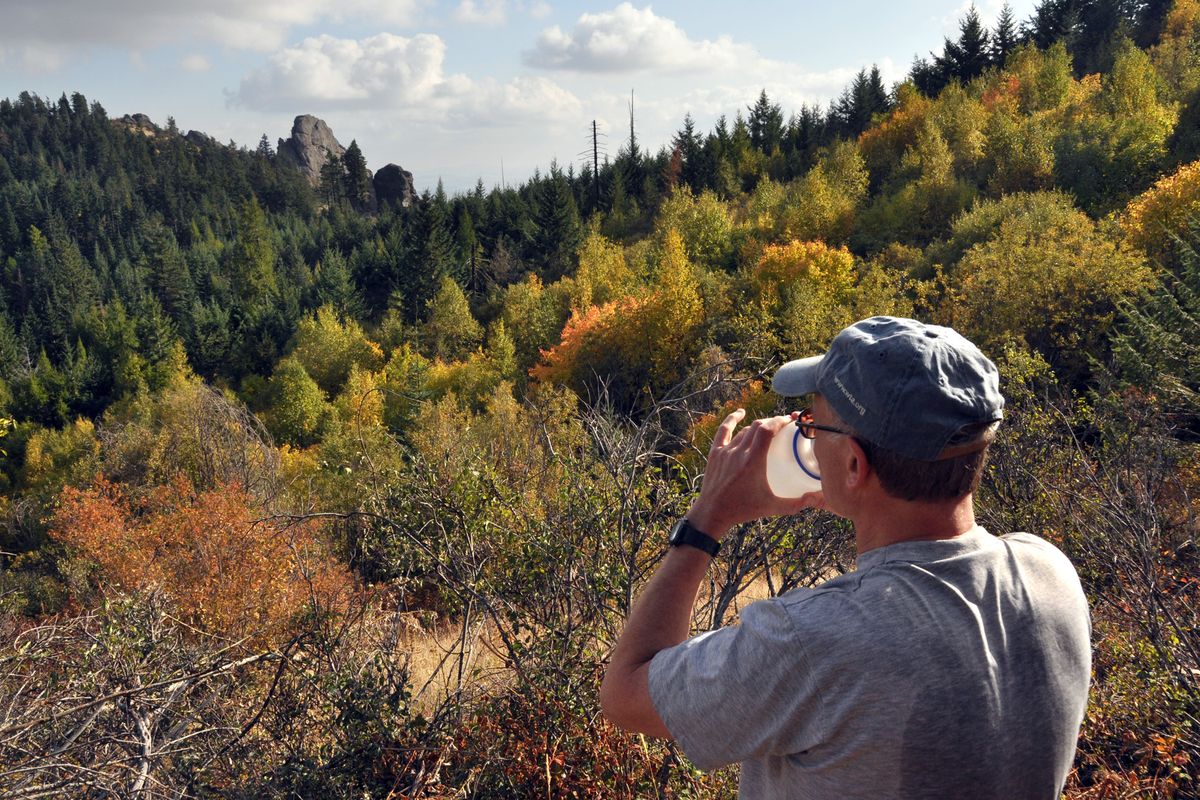Washington Trails volunteers clear way for hikers, bikers

A group of volunteers has blazed the way for hikers and bikers to enjoy the burst of autumn colors in the Iller Creek Conservation Area.
The Washington Trails Association has worked for three years with other local groups to maintain, rebuild and reroute trails in the popular Valley natural area secured by the Spokane County Conservation Futures Program.
A major effort this month has made the trails more foot-friendly.
“We got a big boost from more than two dozen students from Gonzaga University to carve out a new section of trail to replace a very steep, eroded stretch,” said Jane Baker, the WTA’s only certified trail
maintenance crew leader in Eastern Washington.
Although there are years of work to be done, the volunteers have connected a 5-mile loop trail circumnavigating the 876-acres of Iller Creek’s core, and linking the additional new south-end acreage around the Rocks of Sharon.
“A lot of people have no idea what goes into a sustainable trail,” said Ken Mondal, a Spokane opthamologist and WTA board member. “I didn’t either until I started volunteering with Jane.
“Look at all the water dips,” he said, hiking up Iller Creek and pointing to the various diversions and ditches workers have made to check erosion from rain and snowmelt.
“We try to bevel the trails to shed the water. We work with the terrain, but sometimes you just have to muscle through things. I devoted four hours to digging out one root ball when we re-routed this trail.”
Iller Creek is just one of several projects WTA took on this summer. Baker keeps detailed records of the trail work to help when applying for grants for tools and materials.
This year the group scheduled projects on 38 days.
A total of 102 volunteers participated. Some of them worked more than one day, logging a total of 253 volunteer work days.
When the dust settled for the season last week, the WTA groups had invested 3,461 hours into improving the region’s trails.
“We do a little bit of everything: building rock walls, digging drain dips, logging trees, cutting out blowdowns, repairing stream crossings, bridge and water bars as well as angling slopes and grading,” Baker said. “The idea is to make trails that last and are a pleasure to use.”
Spokane produced 64 of the volunteers, while the others were Gonzaga students or volunteers from Western Washington.
Only 5 percent of WTA’s membership lives in Eastern Washington.
“People on the West Side generally were attracted to our multiday work projects, where we work hard and save time for them to explore new places like the Salmo-Priest Wilderness or the Kettle Range,” Baker said.
The projects included 10 days of work at Liberty Lake County Park, eight days at Iller Creek and five days at Mount Spokane.
WTA also worked with the Colville National Forest, devoting four days at Hall Mountain, four days at the Gibraltar Trail near Republic, three days at Bead Lake and three days in the Salmo-Priest Wilderness.
Next year’s projects already are being scoped out, she said, as WTA representatives will be talking with land managers to sort out priorities.
“The longer projects in the backcountry will be posted on the WTA website for people to start signing up in February,” she said.
Local projects, including another major effort at Liberty Lake, will be announced next spring.
“One thing about it, the land managers are very grateful and everybody loves what were doing,” Baker said.
“All of these agencies are cash-strapped,” Mondal said. “We receive no funding for the work we’ve done at Iller Creek or Liberty Lake.”
Steve Christensen, Mount Spokane State Park manager, praised the WTA’s commitment to detail, using modern trail-building techniques, and so did mangers from Spokane County Parks.
“We are so thankful to this group for bringing ready citizen volunteers into the field to complete amazing projects in our community’s parklands,” said John Bottelli, special projects manager for Spokane County Parks.
WTA volunteers are trained by Baker to produce a professional product, Bottelli said.
Pledges from volunteers in groups such as WTA and the Backcountry Horsemen have allowed the County to acquire grant funding for significant trail improvements in several areas, he added.
“Anyone interested in a well-coordinated, rigorous experience building trails right here in Spokane should sign up for a WTA work party.”
“It’s hard for me to make the time to get out and promote what this group can do,” Baker said, “so it was a real blessing to get the support from Gonzaga students this year.”
“I hope in the future we can work with more groups and universities. Right now we’re trying to work out a partnership with Itron to designate a service day for employees to go out and do community work.”
The 26 volunteers who worked on the Iller Creek trails in the one day in October reinforced Baker’s attitude that trail works is good therapy.
“Most of them, especially the college students, had never touched one of the tools we use,” she said. “Halfway through the day they’re comfortable with Pulaskis and building terraces and taking pride in what they were accomplishing.”
Mondal clearly relished coming back a week later to hike the Iller Creek trails he’d help improve.
“We still have steep sections that need to be re-routed and drainage to deal with, but this is vastly better than it was,” he said.
“With more members we can do twice or three times as much in this time when funding for public lands continues to suffer.
“Personally, I really live hiking trails and it seemed only fair to give something back in return.
“Some people don’t like digging in the dirt but can support the organization with a donation.
“We’re looking for all the friends we can get.”